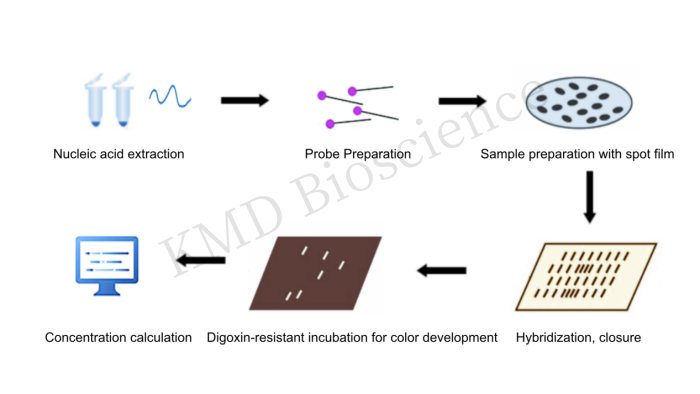Service Line:+86-022-82164980
Address:FL-4, Building A5, International Enterprise Community, Tianjin, China
Email:[email protected]
KMD Bioscience has been dedicated to the field of molecular biology for many years. With the increasing understanding of the structure of genes, gene expression and regulation at the microscopic level, molecular biology testing technology has become a powerful tool in scientific research. Although molecular biology techniques are commonly utilized, they are time-consuming to carry out and the results are unstable, which requires the researchers' energy and time.
KMD Bioscience, which has established a complete molecular biology and immunological detection test platform, with a complete set of molecular biology and immunoassay-related experimental equipment, is able to provide molecular hybridization services for a wide range of scientific research users, including spot hybridization experiments, immunoblotting and so on. Our scientists have accumulated a wealth of experience in experimental operations, with skillful technology to quickly complete the required experiments within the specified period, while ensuring that the test results are accurate, objective and credible. KMD Bioscience insists on providing customers with high-quality services. SNP detection services, DNA methylation sequencing, cDNA library construction and other one-stop technical services can be provided to meet the needs of different customers' experiments.
The principle of the experiment is to denature the DNA to be tested, add its spot on the nitrocellulose membrane (or nylon membrane, NC membrane), hybridize with the labeled probe, wash the membrane (remove the unjoined probe), and radiate the autoradiography to determine whether there is hybridization and its hybridization intensity, which is mainly used for the detection of gene deletion or copy-number alterations.
The experimental steps of Spot Hybridization are mainly to extract nucleic acids from the samples to be examined and then covalently cross-link them onto a nitrocellulose membrane, after blocking,antibody incubation, color reaction and other steps, the nucleic acid content in the sample was semi quantitatively detected. Compared to traditional autoradiograph technology, our laboratory adopts Roche's non-radioactive detection protocol, which uses AP colour development to provide customers with high-precision sample testing services.

|
From Our Customers |
Requirements |
|
Cells, inactivated viruses, DNA, RNA and other samples |
DNA, RNA samples need to be provided 15ug (for probe preparation, detection, etc. |
-- To ensure a high success rate of experiments, it is important to have experienced experimental operators, scientific control group settings, and simple and fast probe design
-- The accuracy of results can be ensured by ensuring reproducibility between different personnel
-- Analyze information, provide detailed experimental reports, including materials, reagents, instruments, methods, data analysis, experimental results, etc., and provide clear experimental images.
-- With a mature molecular biology platform and an immunodetection platform, it can deliver a truly one-stop service experience and save clients valuable time


If you have any questions regarding our services or products, please feel free to contact us by E-mail: [email protected] or Tel: +86-400-621-6806